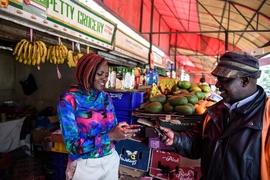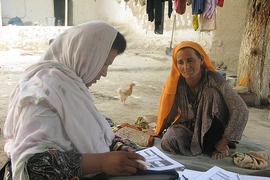Juliana Miranda Mitkiewicz learned a great deal from her role in MIT D-Lab’s Resilient Economies Action Lab (REAL), which is led by D-Lab Inclusive Markets Specialist Libby McDonald. REAL collaborates with regional partners to promote the development of resilient and inclusive economies in Central America.
Mitkiewicz studies sustainable energy systems under the MIT Portugal Program at the Faculty of Engineering of University of Porto in Portugal. Her PhD dissertation work focuses on a small solar-biogas hybrid energy system as a solution for sewage, organic waste management, and energy generation. She recently returned from Mongolia, where she was engaged in an independent project, and Nicaragua, where she was a trip leader for a group of D-Lab: Gender and Development students.
She recently talked with the School of Engineering about her projects and views.
Q: What did you learn while working toward sustainable solutions with villagers in Mongolia and Nicaragua?
A: When I arrived at MIT D-Lab, I thought I would be able to solve basic needs of disadvantaged communities with my technology. However, the vision of D-Lab changed me. Instead of giving technology to communities, the goal is to empower them by co-creating and designing local technologies and businesses that combine scientific with traditional knowledge.
In Mongolia, we aimed to develop sustainable solutions to replace the coal burning process used for heating people’s yurts. This process is highly pollutant and detrimental to health, especially to women and children who spend their days indoors. People from the community, together with local students, built solar water heating systems, charcoal presses, and alternative insulation methods. Women, in particular, felt very empowered by learning how to work with tools, such as hacksaws, gridding and welding.
I also recently had my third field research trip to Estelí, Nicaragua, where we were astonished by the empowerment of cooperatives of female farmers. There is a huge problem in water supply and management, as well as sanitation, where these co-ops are located. These women are also wives and mothers responsible for collecting water for their households. Despite being the people who manage water in their communities, they are not part of local water decision-making committees.
By better understanding the challenges and opportunities for water management, together with power dynamics, my hope is that the water supply crisis can be mitigated. This theme will be further explored in Nicaragua this year, as well as in Ethiopia.
Q: How are these communities dealing with climate change?
A: Most of the communities I have visited are suffering from the effects of climate change without even without knowing exactly what it is. Mongolia has a long way to go to mitigate air pollution. The government is taking steps, but the local communities are not yet aware of them. The city of Ulanbataar provides free electricity at night to reduce the consumption of coal inside the yurts, but people prefer buying a LCD TV than an electric heater.
Contrarily, in Nicaragua, the co-ops of female farmers note that climate change is increasing extreme weather patterns, causing pest appearance and big crop losses. Through agro-ecologic and bio-intensive practices, together with reforestation, they are producing different organic products and exporting them. And at the same time that they are growing grains to feed their families.
Q: Climate change and gender imbalance are highly connected from your experience. What were the main lessons?
A: Gender imbalance is very noticeable in Nicaragua. Not only in the local water committees I mentioned, but also in the impact of flooding caused by weather pattern variations. Flooding kills more women than men because men know how to swim. Most women didn’t learn how. Those examples reflect the current education system and the old fashioned patriarchal society.
Luckily, this women’s foundation, called Fundacion Entre Mujeres, managed to plant a seed to change this reality in Estelí, and it is working! They call the strategy a Feminist Economy, based on a pacific, non-patriarchal economic system, promoting improvements in the quality of life of women. When women are united and have a common ideology, they can do so much!
I consider myself a climate-oriented woman, aiming to reduce gender imbalances and climate change threats. The best way to do that is including all genders, ethnicities, and religions to take actions together and be protagonists of change.








